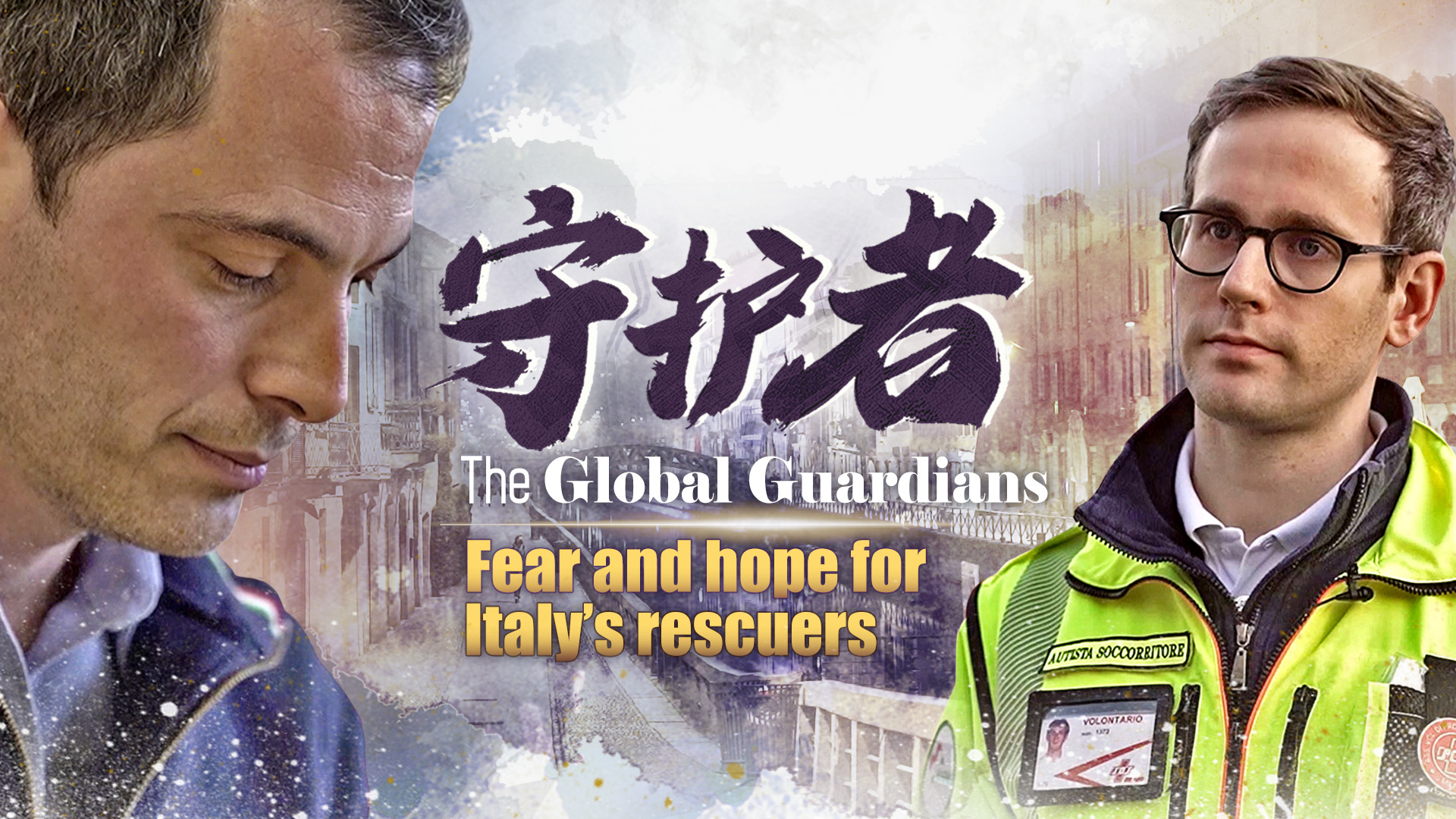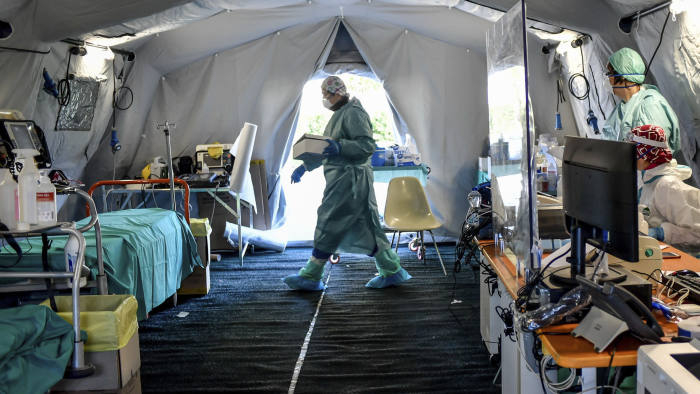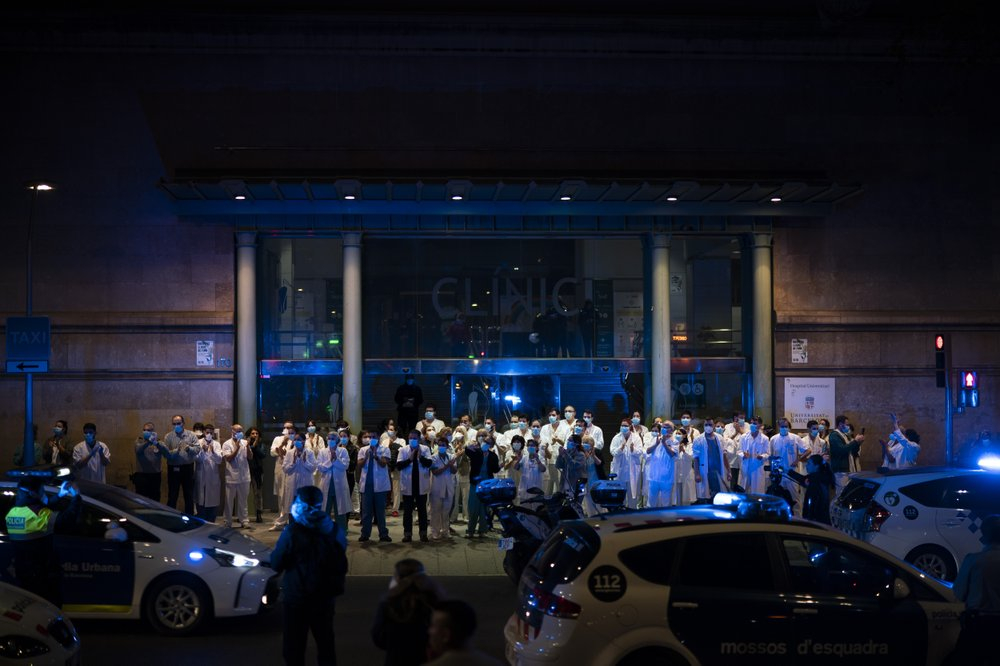Editor's note: This is the 31st article in the COVID-19 Global Roundup series. Here is the previous one.
04:07

The coronavirus is spreading fast across the world, with no sign of relief in sight. According to the Coronavirus Resource Center of Johns Hopkins University, the total number of confirmed cases so far has exceeded 937,000, with 47,235 fatalities.
The U.S., Italy, Spain, China, Germany, France, Iran and the UK are standing atop the pyramid in terms of the total numbers of infections. Except China, which has entered a stable phase of single-digit increase in the number of daily new cases, other countries are still trying to flatten the upward trending curve.
In such testing times, the healthcare systems of severely hit countries are being pushed to their breaking points as the countries scramble to take desperate measures. Per reports, supplies of ventilators and protective masks are running low and number of hospital beds is proving to be insufficient while retired medics are being reactivated.
Facing such a "tsunami" of infections, the world is realizing that even hospitals in developed countries with the world's best healthcare facilities are at risk of becoming triage wards, forcing ordinary doctors and nurses to make extraordinary decisions about life and death.

A worker moves part of a delivery of 64 hospital beds from Hillrom to The Mount Sinai Hospital during the outbreak of the coronavirus disease in Manhattan, New York City, March 31, 2020. /Reuters
A worker moves part of a delivery of 64 hospital beds from Hillrom to The Mount Sinai Hospital during the outbreak of the coronavirus disease in Manhattan, New York City, March 31, 2020. /Reuters
The United States
The world's largest economy is not an exception to the disaster. The country surpassed all other countries worldwide in the number of COVID-19 cases last Thursday, with a total of 82,404 cases at the time. The number grew nearly threefold, standing at 216,515 cases as of 11:30 local time (EDT) Thursday.
The surging number of confirmed cases brought surging number of hospitalizations and looming shortages in supplies, staff and sick beds. New York, New Orleans and other hot spots in the U.S. are asking for help from the federal government, complaining they don't have enough ventilators to meet the urgent need.
At least one New York hospital has begun a trial of sharing single ventilators between two patients. Dr. Craig Smith, chief surgeon at New York-Presbyterian/ Columbia University Medical Center in Manhattan, wrote to staff that teams had worked "day and night" to get the split-ventilation experiment going.
New York State Governor Andrew Cuomo said New York has only received 4,000 ventilators from the federal government, well short of its need. He also said in a briefing that the state was projected by consulting firm McKinsey a need for 75,000 beds for patients with COVID-19, and 25,000 ventilators in the case of high compliance with social distancing measures. However, if people didn't adhere to those directives, the need for beds will be over 110,000 and some 37,000 ventilators will be needed.
New York City Mayor Bill de Blasio had pleaded for reinforcements from the administration of U.S. President Donald Trump, asking for military medics to be deployed, an additional 1,000 nurses, 300 respiratory therapists and 150 doctors.
The U.S. Army has also begun calling up members of the Individual Ready Reserve on a voluntary basis to help combat the spread of the novel coronavirus.
In California, Governor Gavin Newsom also claimed that the state is on track to run out of hospital beds in mid-May. If residents continue to obey physical distancing orders, the most populous U.S. state will face a shortage of 16,000 hospital beds in six to eight weeks.
Trump had warned Americans of a "painful" two weeks ahead, referring to modeling that showed an enormous jump in deaths to a range of 100,000 to 240,000 people from the virus in the coming months. The apex of the crisis will be at the end of this month, which means the shortage of medical supplies will be further aggravated.

A makeshift emergency ward set up to ease pressure on a hospital in Brescia, northern Italy. /AP
A makeshift emergency ward set up to ease pressure on a hospital in Brescia, northern Italy. /AP
Italy
Things seem to getting better in Italy, with its government reporting on Wednesday its lowest daily death toll from coronavirus in six days. However, the overall number of new infections is still growing. The government has extended a national lockdown until at least the middle of April.
Lombardy is the worst-affected region in Italy. Its regional government has reactivated retired doctors and nurses, getting them back on the payroll. In addition, nursing students who were due to take their final exams next month are now expected to graduate in the coming days, so they can be immediately put to work.
According to the region's top health official, Giulio Gallera, 10 percent of Lombardy's doctors and nurses cannot work because they tested positive for the virus. To face the shortage of qualified health workers, Lombardy is also in the process of recruiting staff from abroad. Cuba, China and Venezuela have provided lists of doctors who would be available to start working immediately. And China's medics arrived in Italy weeks ago to offer help.
Meanwhile, officials in many regions have also called for medical supplies, including beds, masks and ventilators. Lombardy has 3.7 hospital beds per 1,000 inhabitants and 0.7 beds for long-term illnesses, according to the Health Ministry.
On March 9, Italy's health minister ordered a 50 percent expansion of intensive care units nationwide, saying more beds were needed in infectious disease wards. President of Lombardy Attilio Fontana has also presented a plan to transform an entire pavilion of Milan's old Expo 2015 fair into an intensive therapy ward. If realized, the project would provide 500 more beds.
Private hospitals in Lombardy have offered up beds in intensive care units and more than a dozen doctors from the private sector have agreed to work in public hospitals to ease the crisis.
"Frankly, I don't know for how long the health system can cope, I don't even want to think about how it could end," Massimo Galli, head of the Department for Infectious Diseases at the Sacco Hospital in Milan, was quoted as saying by the Financial Times. "We are holding up, but other hospitals are much worse off than us and it is a fact that we will come increasingly under pressure in the coming days."

Health workers gather outside a hospital as police officers and residents applaud them for fighting COVID-19 in Barcelona, Spain, March 23, 2020. /AP
Health workers gather outside a hospital as police officers and residents applaud them for fighting COVID-19 in Barcelona, Spain, March 23, 2020. /AP
Spain
The coronavirus death toll in Spain has surged to 9,387, waging a war of attrition against healthcare workers throughout the country, where protective equipment and tests have been in severely short supply for weeks.
The country's hospitals are groaning under the weight of the pandemic. Videos and photos from two hospitals in the Spanish capital showed patients, many hooked up to oxygen tanks, crowding corridors and emergency rooms. At the 12 de Octubre University Hospital, patients could be seen on the floor as they waited for a bed.
According to health authorities, the number of medical personnel infected was nearly 6,500 nationally as of last Wednesday. At least three healthcare workers have died. Widespread infections among health workers raised concerns that it will hamper the ability to respond to the crisis.
In response to the crisis, authorities have called up over 50,000 additional workers, including recent graduates and retired doctors and nurses. The government has also been working to set up hundreds of intensive care beds in a specially created facility in the Fiera Milano exhibition center.
An ice rink in Madrid has been converted into a morgue, and 13-time Champions League winners Real Madrid said their Santiago Bernabeu stadium would be used to store medical supplies, but they are still waiting for sufficient respirators and qualified personnel.
Regarding the supply shortages, Spanish authorities had promised to distribute hundreds of thousands of masks and COVID-19 fast test kits. Last Wednesday, Health Minister Salvador Illa announced a 432-million-euro purchase of Chinese medical material, including 500 million masks, 5.5 million test kits and 950 ventilators.
(With input from agencies)